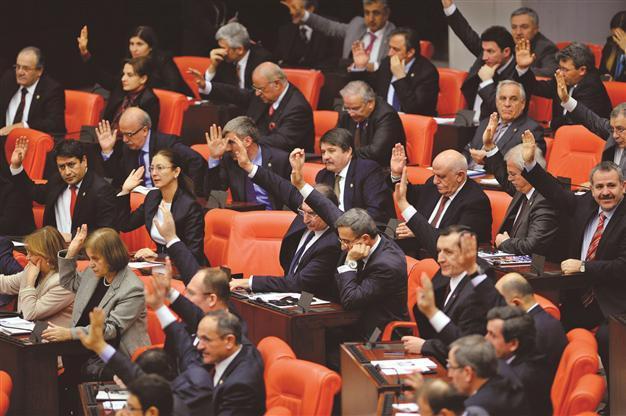AKP loud on self-made charter
ANKARA

Turkish Parliament is not expected to
vote on a new charter soon. AA photo
Parliamentary Speaker Cemil Çiçek is trying hard to overcome deadlock over the new Constitution, but senior ruling party officials seem intent on introducing their own charter and taking it to a referendum if they can secure enough legislative seats.
“We, as the [Justice and Development Party - AKP], will introduce the new charter that the people are demanding. We’ll take it to referendum if we can find 330 votes,” said deputy leader Numan Kurtulmuş.
The AKP has 326 seats and needs at least four more votes to be able to unilaterally take constitutional amendments to a popular vote.
The AKP could either convince deputies from other parties to accede to its plans or formally add oppositional and independent deputies to its ranks. The AKP is planning to introduce its own charter draft to Parliament if the extended mandate of the Constitutional Conciliation Commission, which is tasked with drafting the charter, fails to produce a document.
The commission was established by the four parties represented in Parliament in late 2011 with a plan to finalize the writing process by Dec. 31, 2012. The commission’s mandate ends today, but it has only succeeded in writing 23 articles because there are serious disagreements between the parties over the chapters on fundamental rights and liberties and on the country’s administrative system.
Çiçek has launched a tour of the four parties’ leaders to encourage politicians to redouble their efforts on the charter by moving to end the deadlock and extend the commission’s mandate. The speaker has already held talks with Prime Minister Recep Tayyip Erdoğan and Nationalist Movement Party (MHP) leader Devlet Bahçeli. He will meet with Republican People’s Party (CHP) and Peace and Democracy Party (BDP) probably on Jan. 2, the day the commission is also set to convene to decide on working terms.
“We are at a very critical stage,” Çiçek said, noting that the opportunity should not be wasted.
Erdoğan is said to favor a deadline extension of no more than two or three months, while Bahçeli has suggested April 23, the anniversary of the foundation of the Turkish Parliament in 1920. The CHP, however, is against imposing a deadline on the commission works.
The opposition parties believe the AKP’s insistence on adopting a presidential system is merely a pretext to abort the commission’s works so that it can impose its own charter on Parliament and the Turkish people.
“Whatever they do, we will not be the one leaving the table,” Bahçeli told reporters yesterday.
The articles of the new Constitution will only be finalized if they obtain the approval of all four parties, Deputy Prime Minister Bekir Bozdağ said, adding that the AKP’s proposal of presidential system could not be described as an obstacle hindering the writing process. “This is pure distortion.”
The commission has agreed on 23 articles and shelved 48 other articles for subsequent discussion, Bozdağ said. “All parties bring their own proposals – but their proposals don’t obstruct the process, just the ones brought by the AK Party? That’s not right.”
Kurtulmuş, meanwhile, said the performance of the commission so far had not produced any hope for a four-party constitution.
“You are trying to find consensus over the wording on citizenship. How will you make the CHP, the MHP and the BDP agree? Or how will the CHP and the AKP agree on freedom of religion? Thus, the best way to build new Turkey is a new Constitution,” said Kurtulmuş in reference to a charter to be introduced solely by the ruling party.
Kurtulmuş said he was sure more than 58 percent of the populace would endorse such a Constitution – a reference to the percentage constitutional amendments consisting of 26 articles received in a September 2010 referendum.
